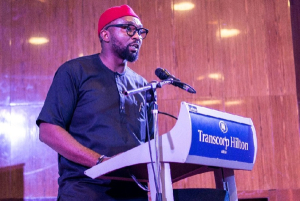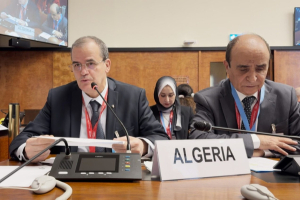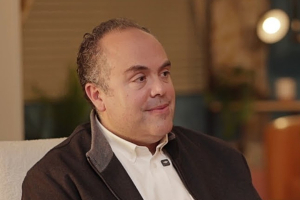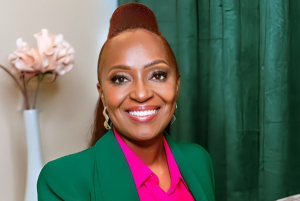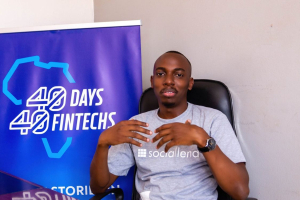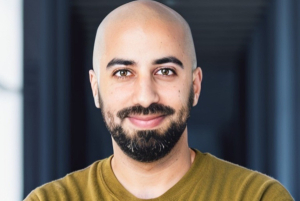Michael Okoye’s LooseChange Simplifies SME Payments in Nigeria
-
LooseChange, founded in 2019 by Michael Okoye, enables small businesses to accept digital payments directly from smartphones without extra hardware.
-
The platform centralizes billing, customer data, and accounting to simplify daily financial management.
-
Okoye aims to make LooseChange a one-stop digital tool for SMEs to track sales, manage receivables, and generate financial reports.
Nigerian entrepreneur Michael Okoye is reshaping how small and medium-sized enterprises (SMEs) record and collect payments through LooseChange, a fintech startup that turns smartphones into payment terminals.
Okoye, who serves as founder and CEO, launched the company in 2019 to help business owners manage transactions, invoices, and customer data from a single interface.
LooseChange’s technology allows merchants to accept digital payments, issue invoices, and maintain simplified accounting records using only a smartphone—eliminating the need for traditional point-of-sale terminals.
The solution consolidates financial operations and automates processes such as invoice generation, receipts, and transaction tracking. By doing so, the platform reduces equipment costs, enhances payment traceability, and improves cash flow management for small businesses.
LooseChange’s system integrates sales tracking, receivable management, and financial reporting across all payment methods. The platform positions itself as a digital one-stop shop for business operations, helping SMEs move toward financial transparency and efficiency.
Okoye’s approach reflects a broader trend in Africa’s fintech ecosystem, where startups increasingly focus on low-cost, mobile-first payment solutions to serve the continent’s vast informal and small-business sectors.
Beyond fintech, Michael Okoye sits on the board of the Nur Outreach Programme for Drugs Education & Reintegration, a Nigerian nonprofit focused on drug prevention and mental health care.
A graduate of Caritas University with a bachelor’s degree in electrical and electronic engineering, Okoye began his career in 2012 as executive development manager at Pyrich Group, a software and IT consulting firm.
In 2015, he joined Topaz ICT Solutions as business development manager, a position he held until 2019. He also served as programs head at the National Youth Council of Nigeria in 2018, reflecting his growing involvement in youth and technology initiatives.
This article was initially published in French by Melchior Koba
Adapted in English by Ange Jason Quenum
Beninese FinTech Founder Yaovi Ghislain Siate Eases African Payments
- Fintech startup Katutu Pay, founded by Beninese entrepreneur Yaovi Ghislain Siate, simplifies financial operations for individuals and freelancers across Africa.
- The UK-based platform offers users unique prepaid virtual cards for secure online transactions and instant, fee-free user-to-user transfers.
- Siate maintains parallel roles as Principal IT Consultant for APEC Congo and as a full-stack developer, demonstrating broad technical engagement across the continent.
Katutu Pay, a UK-based company founded in 2022 by Yaovi Ghislain Siate, operates a platform that acts as an intermediary. The company partners with licensed banks and providers to offer payment services and prepaid cards. The application allows its users to generate a unique virtual prepaid card for every online transaction, enhancing security.
Katutu Pay also authorizes instant, fee-free transfers between platform users. Furthermore, it provides the ability to top up mobile credits for users or third parties across mobile operators. The platform manages payments for utility bills, including water, electricity, and Internet. For freelancers and small entrepreneurs, Katutu Pay offers a professional invoice creation tool based on customizable templates.
Siate previously founded Caddieverse, a pan-African marketplace dedicated solely to digital products. This decentralized social-commerce network enables creators, trainers, and digital entrepreneurs to sell, buy, and share content like e-books, software, training courses, or graphic templates.
He also developed Smart QR Link, an integrated solution for professionals to create, share, and manage their digital identity. The tool combines digital business cards, dynamic QR codes, and mini-showcase websites to strengthen users’ online visibility.
Siate maintains concurrent professional commitments alongside his entrepreneurial activities. He works as Principal IT Consultant for the Professional Association of Credit Institutions of Congo (APEC Congo). He also serves as a full-stack developer at Websoft-Enterprise Engineering, a Beninese digital services firm, and as an IT consultant for Banque Postale du Congo.
Siate graduated from the Haute École de Commerce et de Management (HECM) in Benin. He earned a professional license in IT system technology in 2014. Between 2014 and 2015, he worked as a web developer at Head Lines, a firm specializing in IT engineering and communication.
This article was initially published in French by Melchior Koba
Adapted in English by Ange Jason Quenum
Algeria Mobilizes $1 Billion to Support African Startups
- Algeria has mobilized $1 billion to finance African startups and young innovators under a new continental fund launched by President Abdelmadjid Tebboune.
- The initiative aims to boost innovation in strategic sectors including technology, education, health, and humanitarian aid.
- The move comes as African startup funding dropped from $6.5 billion in 2022 to $3.2 billion in 2024, underscoring the need for sustainable, homegrown financing.
Algeria has committed $1 billion to support African startups as part of its effort to stimulate innovation and strengthen regional economic integration, the country’s Minister of Foreign Trade and Export Promotion, Kamel Rezig, said on October 21.
The funding, part of the African Startup and Young Innovators Financing Fund launched in September by President Abdelmadjid Tebboune, targets projects with high social and economic impact across the continent.
Rezig said the fund will “back entrepreneurs working in priority areas such as technology, education, healthcare, and humanitarian services” to foster African creativity and expand intra-continental trade.
The announcement comes amid a sharp decline in startup financing across Africa. Data from Partech Africa show that funding fell from a record $6.5 billion in 2022 to $3.5 billion in 2023, and stabilized at about $3.2 billion in 2024.
Despite the slowdown, the continent’s tech sector has remained resilient, prompting governments and investors to develop more sustainable, locally anchored financial mechanisms.
Domestically, Algeria has built momentum in entrepreneurship. Government data show that by mid-2025 the country hosted 1,600 microenterprises, 130 startups, 1,175 projects labeled “innovative,” and 2,800 registered patents. Authorities aim to grow the number of startups to 20,000 by 2029.
Entities such as Algeria Venture and the National Startup Fund have been instrumental in mentoring entrepreneurs, facilitating access to capital, and connecting innovators with regional networks.
Officials said the continental fund will strengthen collaboration among Algerian and African entrepreneurs in key industries such as fintech, agritech, digital health, and renewable energy.
Over time, the initiative is expected to help structure an integrated African innovation ecosystem capable of generating skilled jobs, accelerating digital transformation, and improving the continent’s economic resilience.
This article was initially published in French by Samira Njoya
Adapted in English by Ange Jason Quenum
Sameh Saleh Unlocks Asset-Backed Financing for Egyptians with MNZL
- Egyptian entrepreneur Sameh Saleh founded MNZL in 2022 to allow citizens to use property, vehicles, and land as collateral for easier access to capital.
- MNZL’s model, inspired by the “home equity” concept, lets users secure loans while retaining ownership of their assets.
- Saleh previously founded and sold Hawaya, a Muslim dating app acquired by Match Group.
Serial entrepreneur and investor Sameh Saleh is reshaping how Egyptians leverage their physical assets to access financing. Through his latest venture, MNZL, Saleh aims to unlock new paths for individual funding by transforming owned assets into tools for liquidity.
Founded in 2022, MNZL specializes in asset-backed financing. The Cairo-based startup operates a digital platform that enables property, vehicle, and landowners to convert asset value into financial leverage.
The company’s digital portfolio system allows users to manage collateralized loans via a mobile application available on Android and iOS. Customers can apply for credit, pledge assets, and receive funds through a single, integrated interface.
MNZL’s model draws inspiration from the “home equity” concept, tailored to Egypt’s regulatory environment. The approach enables individuals to secure flexible, lower-interest loans while retaining ownership of their assets.
Before MNZL, Saleh built a successful track record in the tech ecosystem. He founded Tripdizer in 2016, a travel platform that helped Egyptians plan low-budget trips. A year later, he launched Hawaya (formerly Harmonica), a faith-based dating app designed for Muslims seeking culturally respectful relationships.
Saleh led Hawaya until 2022, when it was acquired by Match Group, the U.S. company behind Tinder and Meetic.
Saleh holds a bachelor’s degree in reservoir engineering from Petronas University of Technology (2011) and a master’s in petroleum engineering from Heriot-Watt University (2015), both in Malaysia.
Between 2011 and 2018, he worked as a senior reservoir engineer at Petronas, Malaysia’s national oil and gas company, before transitioning full-time into entrepreneurship.
This article was initially published in French by Melchior Koba
Adapted in English by Ange Jason Quenum
Mohammed El-Beltagy Turns AI Into Efficiency Lever for Businesses
Moroccan entrepreneur Mohammed El-Beltagy has built his career around applying artificial intelligence to business performance. He founded and leads Optomatica, a deep-tech consulting firm specializing in AI, machine learning and advanced optimization.
Optomatica focuses on accelerating the transition from ideas to final products by developing tailored AI systems that improve decision-making and data management. The company positions itself as “AI-First” and adapts its technologies to operational contexts across industries.
Founded in 2003, Optomatica operates in fintech, sports technologies, digital health, conversational intelligence, logistics, and process optimization. The firm aims to create practical AI applications and unlock new technical opportunities for clients and their markets.
Alongside Optomatica, El-Beltagy has pursued multiple ventures. In 2014, he co-founded Racefox, a digital coach for running and cross-country skiing. Four years later, he launched ConsultingPad, a platform linking consultants with enterprises, and joined AIM Technologies, an AI-focused firm, as a board member.
In 2021, he helped establish Optofolio, a wealth management platform; Jilatee, a circular fashion company; and DFin Holding, a fintech venture.
Since 2022, El-Beltagy has served as co-founder and chief technology officer of Flend, a financing platform that uses data and technology to support small and medium-sized enterprises. That same year, he founded Racemate, a sports technology company, where he chairs the board and serves as CTO.
El-Beltagy graduated in biomedical engineering from the American University in Cairo in 1994. He earned a master’s degree in mechatronics from Lancaster University in 1996 and a PhD in mechanical engineering from the University of Southampton in 2000.
His professional record includes senior positions in technology firms. From 2007 to 2017, he worked at Hive Streaming, a live video distribution company, as chief scientist and later as innovation director. Between 2013 and 2017, he served as innovation director at Novelari, an innovation accelerator. More recently, from 2020 to 2021, he was CTO at Elves, an Egypt-based travel app.
This article was initially published in French by Melchior Koba
Adapted in English by Ange Jason Quenum
iKhokha CEO Matt Putman Expands Access to Digital Payments in Africa
South African entrepreneur Matt Putman has emerged as one of the key players shaping electronic payments on the continent. As co-founder and chief executive of fintech firm iKhokha, he has focused on helping small merchants and businesses adopt digital tools.
Founded in 2012 with Ramsay Daly and Clive Putman, iKhokha offers affordable electronic payment solutions through mobile point-of-sale devices certified by major card networks. Merchants can accept payments via cards, e-wallets, and QR codes.
The company integrates services such as cash register management, reporting, invoicing, e-commerce and microfinancing into a single mobile application. It has also developed a cash advance product to improve access to credit for small enterprises often excluded from traditional banking.
In August 2025, Nedbank acquired iKhokha for about $94 million. Despite the acquisition, the company continues to operate with independent management, allowing it to preserve its entrepreneurial approach while leveraging the bank’s resources.
Putman graduated with a bachelor’s degree in media and communications from the University of KwaZulu-Natal in 2006. He began his career in 2003 in the UK at TMP Worldwide, an agency specialized in digital and social transformation of employer branding. Between 2006 and 2009, he worked as marketing director at Mainline Property Brokers, a real estate company.
This article was initially published in French by Melchior Koba
Adapted in English by Ange Jason Quenum
10mg Credit Boosts Nigerian Healthcare Access with AI-Powered Financing
-
10mg Credit, a Nigerian fintech solution, offers instant, collateral-free credit to healthcare providers for medical supplies.
-
The platform leverages AI to assess creditworthiness, approving most applications within minutes.
-
Since its launch, 10mg Credit has financed over 6,000 healthcare providers, disbursing more than $3.4 million.
Access to financing remains a significant hurdle for small and medium-sized enterprises across Africa. In Nigeria, a nascent startup has introduced a solution specifically targeting the healthcare sector.
10mg Credit, a fintech solution developed by Nigerian startup 10mg Health, provides instant, collateral-free credit to healthcare facilities. These facilities use the credit to procure medicines and medical equipment. Christian Nwachukwu founded the startup in 2022.
The company said its AI-driven system quickly analyzes transaction histories to approve most applications within minutes, eliminating paperwork and delays, and provides flexible, transparent repayment plans to help users manage expenses without stress.
Healthcare establishments can opt for 10mg Credit when making purchases, either through its platform or via partner distributors. The approval process relies on AI technology, which evaluates applicants' creditworthiness in real-time. This system grants credit within minutes, requires no physical collateral, and offers repayment terms tailored to each facility's cash flow.
By enabling hospitals to pre-finance purchases, 10mg Credit helps reduce service interruptions and enhances the healthcare system's resilience. Since its inception, the solution claims to have financed over 6,000 healthcare providers, with a total volume exceeding $3.4 million and a loan approval rate near 60%. However, the startup faces challenges in managing repayment risk, securing data, and extending coverage to less connected areas.
Regarding data protection, the startup asserts it only collects information necessary for fair and instant decisions, "encrypting it end-to-end for maximum protection."
This article was initially published in French by Adoni Conrad Quenum
Adapted in English by Ange Jason Quenum
Kenyan Entrepreneur Serah Mwikali Katusya Expands Africa’s Digital Marketing Footprint
Kenyan entrepreneur Serah Mwikali Katusya is helping African businesses scale their digital presence through Belva Digital, a technology marketing agency she founded in 2013.
The firm provides end-to-end services in content marketing, SEO, UX/UI design, app development, digital advertising and organizational transformation. Its team combines data, strategy, media and tech expertise to support clients ranging from startups to large corporations.
Belva Digital has rolled out AXIS, an integrated platform that centralizes customer engagement across Facebook, WhatsApp, SMS and Instagram, and launched GrowthLab, a subsidiary focused on digital transformation and performance optimization.
Beyond Belva Digital, Katusya has founded or co-founded several ventures. In 2023 she launched WildMango, a branding and organizational development company, and ChangeKraft, a consultancy for institutions. In 2024, she co-created Muse Money Africa, a digital finance platform.
Her career began in 2004 as brand manager at Sarova Hotels in Kenya. She later worked as media director at WPP-Scangroup (2012–2013), and from 2016 to 2021 served as managing director for Sub-Saharan Africa at EssenceMediacom, a global marketing agency.
Katusya holds an advanced diploma in mass communication from the Kenya Institute of Mass Communication (2004) and a master’s degree in strategy, organizational management, leadership and social entrepreneurship from Hult International Business School (2024).
Recognized for her leadership, she was named among Kenya’s most influential women in marketing in 2022 and won the award for Best CEO in MarTech in 2024.
Her trajectory highlights how local initiatives in marketing technology are driving Africa’s digital growth and supporting businesses adapting to a rapidly changing marketplace.
This article was initially published in French by Melchior Koba
Adapted in English by Ange Jason Quenum
Ugandan Tech Entrepreneur Marvin Peter Akankwasa Builds Fintech Bridges for African SMEs
Ugandan entrepreneur Marvin Peter Akankwasa is reshaping access to finance in Africa with digital platforms designed to link small businesses directly with lenders.
Akankwasa is the founder and CEO of Social Lend Africa, a fintech startup launched in 2019 that uses artificial intelligence to connect entrepreneurs with investors, bypassing traditional banking bottlenecks. The platform tailors loan rates through proprietary algorithms while providing lenders with risk assessments to secure their investments.
Borrowers must submit identity details, proof of residence, tax certificates and business documents, while lenders only need to verify the source of their funds. The company primarily targets small and medium-sized enterprises (SMEs) that often struggle to secure credit.
In 2023, Akankwasa also launched Highlend, a startup developing credit decisioning technology aimed at helping financial institutions manage risk. The company has set a target of working with 10,000 financial institutions across 10 African markets by 2033.
His entrepreneurial track record spans beyond fintech. In 2015, he founded African Food Vending Solutions, a fast-food distribution venture. Three years later, he co-founded Ugabus, an intercity bus network and online booking platform, which was acquired in 2021 by transport startup Treepz. Following the acquisition, he served as head of legal and general affairs at Treepz until 2023.
This article was initially published in French by Melchior Koba
Adapted in English by Ange Jason Quenum
With Konnect Networks, Amin Ben Abderrahman Simplifies Financial Flows for SMEs
Digital finance is rapidly evolving across Africa, driven by local initiatives that are reshaping how businesses and individuals interact with money. Young entrepreneurs are creating solutions tailored to the continent’s unique needs.
Amin Ben Abderrahman is a Tunisian entrepreneur at the forefront of Africa’s fintech sector. He is the co-founder and CEO of Konnect Networks, a start-up specializing in financial technology.
Founded in 2021, Konnect Networks aims to simplify complex financial flows and support the growth of businesses of all sizes through diversified, intuitive, and secure payment solutions.
The platform offers a range of services, including payment gateways, digital wallets, and financial inclusion tools. It enables individuals and businesses to send, receive, and manage payments in real time. Konnect supports transactions both online and in-person via instant payment links, e-commerce API integrations, QR code payments, and real-time notifications. Merchants benefit from an advanced administrative interface, multi-account management, and personalized support.
Konnect states, “We believe everyone should have equal access to financial opportunities. Our commitment is to promote inclusion by providing accessible financial solutions that enable individuals and businesses to access quality financial services, regardless of their background or location.”
Amin Ben Abderrahman earned an engineering degree in IT consulting and management from CY Tech in France in 2010. He began his career in 2012 at the Royal Bank of Scotland in Scotland as a quality manager for financial services.
In 2016, he joined Swiss fintech Leonteq as a risk and finance data specialist. The following year, he became a technical manager at Mars, the confectionery manufacturer. He then worked as a senior consultant for BeeSoSmart Consulting in Paris and later for OneStream, a fintech company based in the UK.
Melchior Koba


